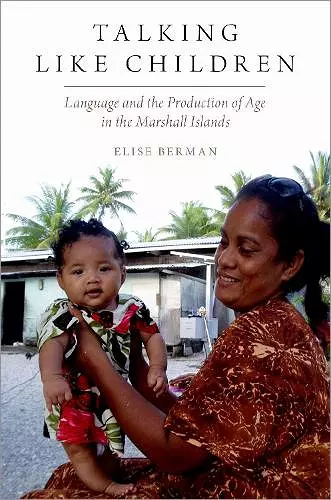Talking Like Children
Language and the Production of Age in the Marshall Islands
Format:Paperback
Publisher:Oxford University Press Inc
Published:21st Mar '19
Currently unavailable, and unfortunately no date known when it will be back
This paperback is available in another edition too:
- Hardback£98.00(9780190876975)

Children in the Marshall Islands do many things that adults do not. They walk around half naked. They carry and eat food in public without offering it to others. They talk about things they see rather than hiding uncomfortable truths. They explicitly refuse to give. Why do they do these things? Many think these behaviors are a natural result of children's innate immaturity. But Elise Berman argues that children are actually taught to do things that adults avoid: to be rude, inappropriate, and immature. Before children learn to be adults, they learn to be different from them. Berman's main theoretical claim therefore is also a novel one: age emerges through interaction and is a social production. In Talking Like Children, Berman analyzes a variety of interactions in the Marshall Islands, all broadly based around exchange: adoption negotiations, efforts to ask for or avoid giving away food, contentious debates about supposed child abuse. In these dramas both large and small, age differences emerge through the decisions people make, the emotions they feel, and the power they gain. Berman's research includes a range of methods -- participant observation, video and audio recordings, interviews, children's drawings -- that yield a significant corpus of data including over 80 hours of recorded naturalistic social interaction. Presented as a series of captivating stories, Talking Like Children is an intimate analysis of speech and interaction that shows what age means. Like gender and race, age differences are both culturally produced and socially important. The differences between Marshallese children and adults give both groups the ability to manipulate social life in distinct but often complementary ways. These differences produce culture itself. Talking Like Children establishes age as a foundational social variable and a central concern of anthropological and linguistic research.
This excellent monograph engages critically with the theoretical literature on language socialization and the study of age through ethnographic exploration of village life in the Marshall Islands. Berman uses precise ethnolinguistic data to make her conceptual points and narrative threads to create coherence within and between chapters. * Kathleen C. Riley, Rutgers, Pacific Affairs *
Recommended. * P. Passariello, CHOICE *
This book will be of interest to veteran ethnographers and linguists, especially those working in the area of language socialization and those engages in research related to the Pacific Islands, and it should also be required reading for students preparing to embark on their own ethnographic fieldwork. * Scott Saft, Pragmatics and Society *
We usually think of age, like race and gender, as biological but Elise Berman shows through this beautifully written book that age is actually produced by the ways elders interact with them. It knocked my theoretical socks off. It will do that to you too as you get to know these vivid individuals inhabiting a sliver of land on an atoll in the endangered Marshall Islands. * Susan D. Blum, Professor of Anthropology, University of Notre Dame *
Berman has written one of the most compelling ethnographies of children's lives since Elinor Ochs and Bambi Schieffelin defined the study of language socialization for anthropology. Not only is Berman's ethnography a rich and poignant analysis of Marshallese social life, it is a monumental rethinking of age and its significance for practice and theory in the social sciences. * Barbra Meek, Professor of Anthropology and Linguistics, University of Michigan *
This is a remarkable book with a challenging thesis: that children are socialized to be different from adults. In other words, they learn to behave differently from adults through social interaction rather than being 'naturally' more naive. Beautifully written and clearly explained, this is both a neat theoretical intervention and a great book for the classroom. * Tanya Marie Luhrmann, Howard H. and Jessie T. Watkins University Professor of Anthropology and Professor, by courtesy, of Psychology, Stanford University *
Want to have your comfortable understanding of age shaken up? Read Elisa Berman's book! It challenges the ubiquitous idea of age being biologically determined. She shows how and why it's different elsewhere -- in this case on a tiny atoll in the Marshall Islands. You'll never again read social science that takes chronological age as an independent variable the same way. These are rather ideologies dressed as objective neutral facts about the world, and about human nature. Commonsense but unexamined assumptions about the naturalness of precise chronological age are actually ethnographically rare and historically recent. * Susan D. Blum, Assistant Professor of Anthropology, UNC Charlotte *
- Winner of Finalist for 2020 AAAL Book Award.
ISBN: 9780190876982
Dimensions: 155mm x 231mm x 15mm
Weight: 544g
224 pages